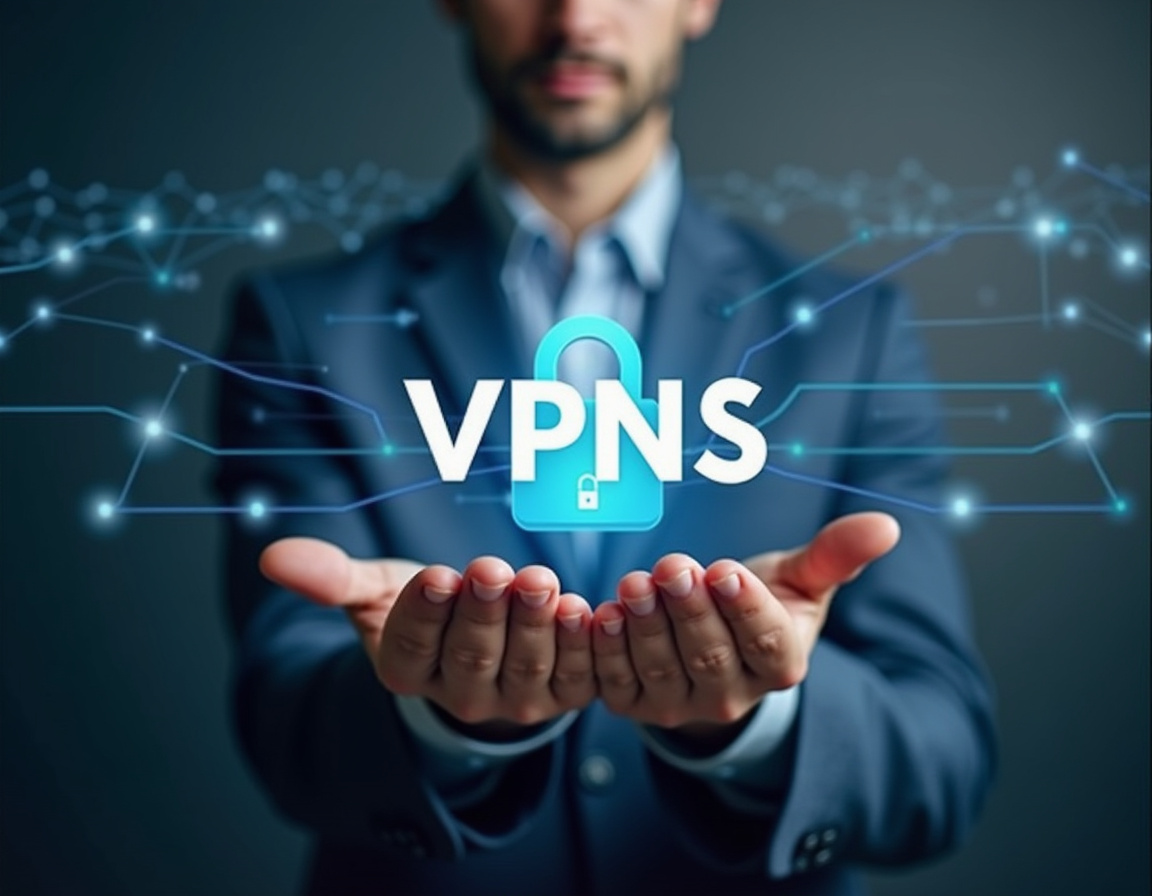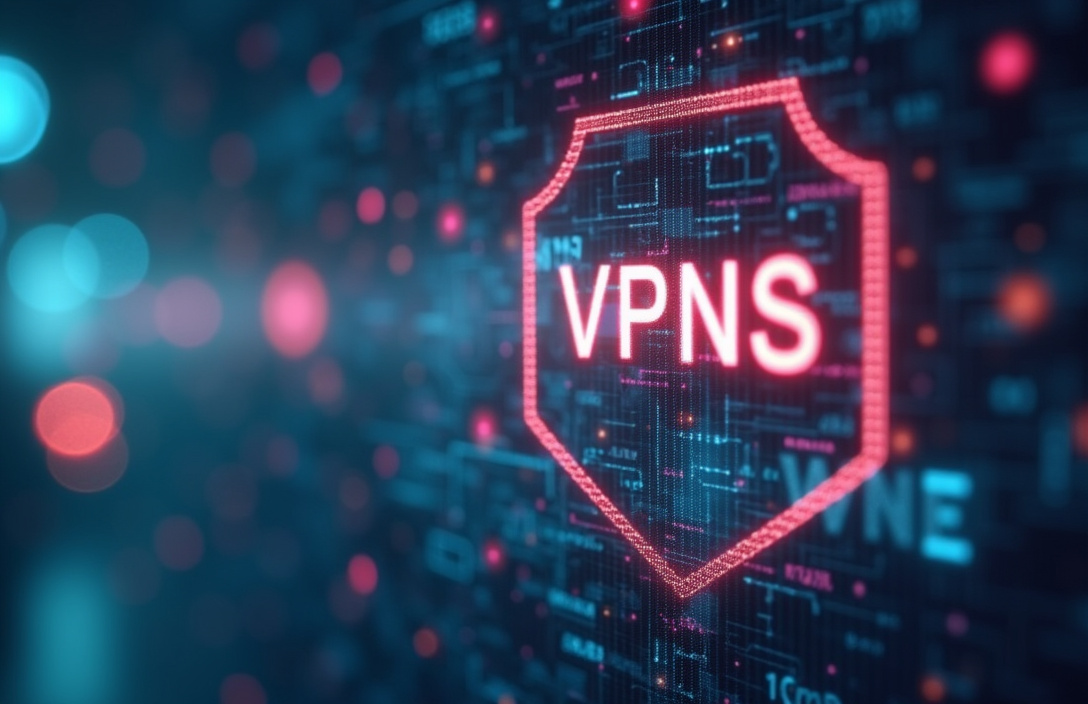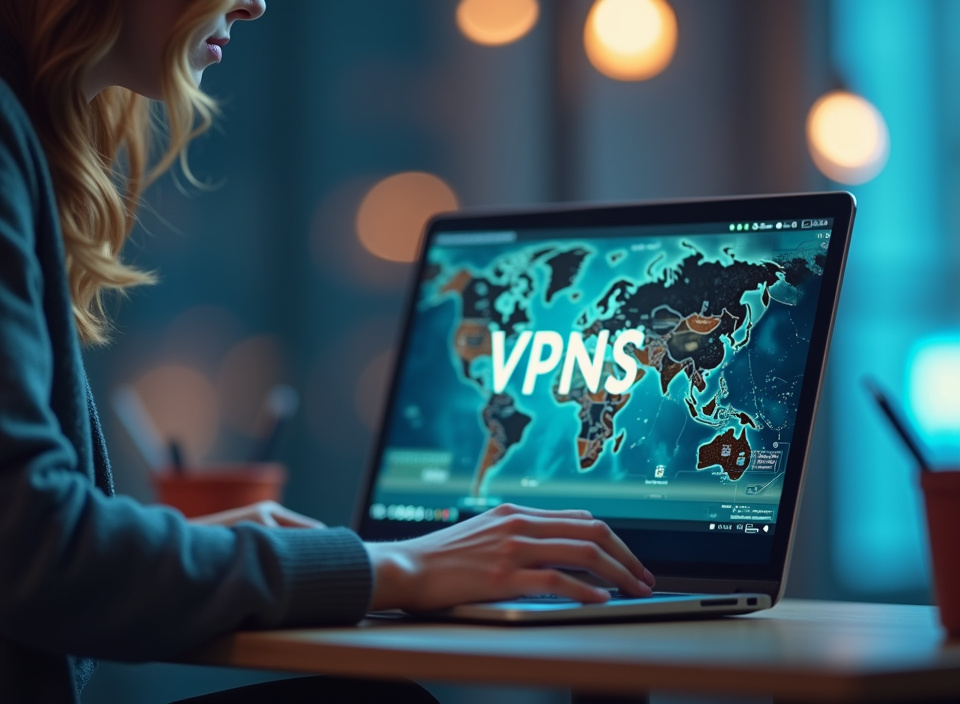VPNs for Remote Teams: Streamlining Secure Collaboration

Table of Contents
In an era defined by digital transformation and the rise of distributed workforces, the need for robust cybersecurity measures has never been more critical. Remote teams, while offering flexibility and access to a wider talent pool, inherently introduce unique security challenges. Without proper safeguards, sensitive company data can be vulnerable to interception, theft, or malicious attacks.
Enter the Virtual Private Network (VPN), a technology that provides a secure and encrypted connection for remote workers, effectively shielding their online activity and ensuring the confidentiality of sensitive information. This article delves into the world of VPNs for remote teams, exploring how they can streamline secure collaboration, enhance team connectivity, and fortify work security in today's dynamic business environment. We will examine the core functionalities of VPNs, highlight key features designed for remote teams, and provide guidance on selecting the right VPN solution for your organization, ultimately empowering your remote workforce to collaborate securely and efficiently, maintaining productivity and innovation while minimizing the inherent risks associated with dispersed work arrangements.
The modern business landscape is increasingly reliant on remote teams, yet this paradigm shift brings forth significant cybersecurity vulnerabilities. The very essence of remote work, where employees access company assets from disparate and often unsecured networks, creates openings that malicious actors can exploit. Therefore, implementing robust VPN solutions for teams is not merely an option, but a critical necessity for safeguarding business continuity, protecting intellectual property, and cultivating a fortified work environment.
VPNs act as a crucial line of defense, encrypting data transmission and creating secure tunnels that shield sensitive information from unauthorized access. By prioritizing work security through VPN implementation, organizations can mitigate the risks associated with remote work and foster a climate of trust and confidence among their employees. Effective team connectivity relies on establishing a secure and dependable connection for every team member, regardless of their geographical location.
VPNs offer a seamless and secure means of accessing company resources, enabling remote workers to participate fully in collaborative projects without compromising data integrity. This article will comprehensively explore the mechanisms of VPNs, uncovering their ability to amplify secure collaboration, bolster team connectivity, and ultimately defend your organization's valuable assets within the remote work sphere. Careful consideration of your remote team's specific needs when choosing a VPN solution is paramount.
Aspects like the number of users, bandwidth requirements, desired security levels, and ease of use should all be meticulously assessed to guarantee that the selected VPN effectively addresses the distinct demands of your organization. Furthermore, continuous monitoring and proactive maintenance are crucial for sustaining the VPN's effectiveness and countering emerging security threats. Furthermore, VPNs contribute significantly to maintaining regulatory compliance, especially when dealing with sensitive data governed by regulations such as GDPR or HIPAA.
By encrypting data and masking IP addresses, VPNs help organizations adhere to data privacy requirements and minimize the risk of costly penalties associated with data breaches or non-compliance. In conclusion, VPNs are indispensable tools for any organization with a remote workforce, fostering secure collaboration, enhancing team connectivity, and prioritizing work security. By selecting the right VPN solution and implementing best practices for remote work security, businesses can empower their remote teams to excel while safeguarding invaluable data and upholding their commitment to regulatory compliance.
They are more than just a simple tool; they are an investment in the long-term security and success of your remote workforce. Remote Team VPNs offer an vital line of defense against the rising wave of cyber threats specifically targeting remote employees.
The fundamental principle behind a VPN is its creation of a secure, encrypted connection between a user's device and a remote server, effectively concealing their IP address and channeling their internet activity through a protected tunnel. This process ensures that all data transmitted between the user's device and the VPN server is shielded from interception and eavesdropping, even when the user is connected to public Wi-Fi networks or other inherently insecure connections. For remote teams, this capability is exceedingly valuable, enabling employees to access critical company resources, exchange sensitive documents, and communicate with colleagues without the ever-present fear of data compromise.
The encryption algorithms employed by VPNs, such as Advanced Encryption Standard (AES) with 256-bit keys (AES-256), are computationally intensive and considered virtually impenetrable, offering a high degree of security against even the most determined and sophisticated cyberattacks. In addition to encryption, a VPN can also mask the user's true IP address, making it significantly harder for websites, online services, and potential attackers to track their online activities and physical location. This enhanced privacy is of particular importance for remote workers who may be accessing sensitive financial or personal information from personal devices or networks that are outside the direct control of the company's IT security infrastructure.
When choosing a VPN for your remote team, it is imperative to select a provider that not only offers a robust and up-to-date encryption protocol but also maintains a strict no-logs policy. A no-logs policy guarantees that the VPN provider does not store any records of your online activity, including browsing history, IP addresses, connection timestamps, or data transfer volumes. This commitment significantly enhances privacy and protects your data from potential misuse or disclosure.
Team connectivity is further augmented by the capacity of VPNs to provide access to geographically restricted content and resources. Many organizations maintain data centers or servers that are located in specific regions, which can unintentionally limit access for employees situated in other parts of the globe due to licensing agreements, regulatory compliance requirements, or network infrastructure limitations. A VPN effectively circumvents these geographical restrictions by enabling users to connect through a server located in the required region, thereby making it appear as though they are physically present in that location.
This capability is undeniably beneficial for remote teams that are geographically dispersed across multiple countries or continents, allowing them to collaborate seamlessly and access the necessary resources without hindrance. Furthermore, A crucial advantage of VPNs for remote teams is their potential to elevate the efficiency of team interactions. VPN offer all team members a secure and solid connection, which encourages easy communication and sharing of data.
This is crucial whenever sensitive data or secret projects are involved. Through VPNs, shared files, databases, project management resources become accessible guaranteeing that team associates receive support to stay fruitful and work in sync. Safe collaboration platforms that offer incorporated VPN functionality boost workflow and enrich security.
It's essential to bear in mind that not all VPN services are developed equal. While a few offerings may claim to prioritize security and privacy, many have proven to be misleading or outright unsafe. Choosing a reputable vendor with a proven track for stability, reliability, and a strong dedication to users privacy is essential.
Beyond the foundational security benefits that VPNs provide, VPN solutions for teams offer a multitude of advanced features specifically engineered to boost remote work productivity, streamline collaboration, and enhance overall network management. One such feature is split tunneling, a highly valuable capability that empowers users to selectively route a portion of their internet traffic through the encrypted VPN tunnel while allowing the remaining traffic to bypass it and connect directly to the internet. This nuanced approach offers several advantages.
For instance, employees can securely access confidential company resources and internal applications through the VPN while simultaneously accessing local websites, streaming media services, or participating in video conferences without experiencing any performance bottlenecks or bandwidth limitations on the VPN connection. The ability to prioritize specific traffic through the VPN ensures that sensitive data remains protected while allowing for optimal performance for non-sensitive tasks. Centralized management is another indispensable feature for VPN solutions designed for teams, particularly larger organizations with numerous remote employees.
This capability provides IT administrators with a unified console to effortlessly configure, monitor, and manage VPN connections for all team members. Centralized management dramatically simplifies the deployment process, ensures consistent security policies are enforced across all devices, and grants administrators comprehensive visibility into VPN usage patterns and potential security threats. Furthermore, this centralized control enables administrators to quickly revoke access for former employees, compromised devices, or users exhibiting suspicious behavior, thereby minimizing potential security risks and preventing unauthorized access to sensitive company data.
Advanced VPN solutions for teams often incorporate features such as multi-factor authentication (MFA) and device posture assessment, adding extra layers of security and reinforcing the overall defensive posture of the network. MFA mandates that users provide multiple forms of identification – such as a password, a one-time code sent to their mobile device, or a biometric scan – before gaining access to the VPN. This significantly reduces the risk of unauthorized access, even if a user's password has been compromised through phishing attacks or other methods.
Device posture assessment takes a proactive approach to security by evaluating the security configuration of a user's device before allowing it to connect to the VPN. This assessment verifies that the device meets the company's predefined security standards, such as having the latest operating system updates installed, running a real-time anti-malware solution, and adhering to password complexity requirements. Devices that fail to meet these standards can be denied access to the VPN or quarantined until the necessary security measures are implemented, preventing potentially infected or vulnerable devices from compromising the network.
This comprehensive approach significantly reduces the risk of malware infections spreading through the VPN and compromising sensitive company data. Work security is significantly improved with these additional layers of protection, ensuring that the VPN provides a robust and reliable shield against a wide range of cyber threats. Finally, the selection of an appropriate VPN protocol is a critical technical consideration.
OpenVPN, WireGuard, IKEv2/IPsec, and SSTP are among the most popular protocols, each offering distinct trade-offs between security, connection speed, stability, and compatibility with different operating systems and devices. OpenVPN is widely recognized as one of the most secure and versatile protocols, offering a high degree of customization and support for a wide range of encryption algorithms. WireGuard is lauded for its exceptional speed and efficiency, making it an excellent choice for mobile devices and bandwidth-intensive applications.
IKEv2/IPsec is known for its stability and ability to seamlessly re-establish connections after network interruptions, making it well-suited for mobile users who are constantly moving between different networks. The best choice for your remote team will depend on your unique security requirements, performance needs, and the types of devices your employees use.
Implementing a VPN solution for a remote team is not simply a matter of selecting a provider and deploying the software. A successful implementation requires careful planning, proper configuration, and ongoing maintenance to ensure that the VPN effectively protects sensitive data and supports the team's productivity. The first step in the implementation process is to conduct a thorough assessment of your organization's security needs and identify the specific risks that the VPN is intended to mitigate.
This assessment should consider factors such as the sensitivity of the data being accessed remotely, the types of devices being used by remote workers, the security of the networks they are connecting from, and the potential threats facing your organization. Based on this assessment, you can define clear security policies and requirements for VPN usage, including acceptable use policies, password complexity requirements, and device security standards. Once you have defined your security policies, you can begin to evaluate different VPN solutions and select one that meets your specific needs.
When evaluating VPN providers, consider factors such as the features offered, the level of security provided, the performance and reliability of the network, the ease of use of the software, the availability of support, and the pricing structure. It is crucial to choose a provider with a proven track record of security and reliability and a strong commitment to protecting user privacy. After selecting a VPN provider, you will need to configure the VPN software on each device used by your remote team.
This process typically involves downloading and installing the VPN client software, configuring the connection settings, and authenticating with the VPN server using a username and password or other authentication method. To simplify the configuration process, many VPN providers offer centralized management tools that allow you to deploy and manage VPN connections for all team members from a single console. Once the VPN is configured, it is essential to thoroughly test the connection to ensure that it is working properly and that all traffic is being routed through the encrypted VPN tunnel.
You should also test the VPN's ability to protect against common security threats, such as DNS leaks and IP address leaks. Ongoing monitoring and maintenance are critical for ensuring the continued effectiveness of the VPN solution. You should regularly monitor VPN usage patterns, security logs, and performance metrics to identify potential problems or security threats.
You should also keep the VPN software up to date with the latest security patches and updates. Proper training is also crucial for ensuring that remote team members understand how to use the VPN correctly and how to protect themselves against security threats. Training should cover topics such as how to connect to the VPN, how to identify phishing emails, how to protect their passwords, and how to report security incidents.
Security awareness training should be an ongoing process to keep remote team members informed about the latest security threats and best practices. Finally, it is essential to review and update your VPN security policies and procedures regularly to reflect changes in your organization's security needs and the evolving threat landscape. This includes reviewing the VPN configuration settings, updating the acceptable use policies, and providing additional training to remote team members as needed.
In conclusion, VPNs are indispensable tools for organizations seeking to empower their remote teams with secure collaboration capabilities. By establishing encrypted connections, VPNs safeguard sensitive data from prying eyes, ensuring confidentiality and integrity in a decentralized work environment. Enhanced team connectivity, facilitated by VPNs, enables seamless access to geographically restricted resources and fosters efficient communication among remote team members.
Prioritizing work security through VPN implementation mitigates the risks associated with remote work, fostering a culture of trust and compliance within the organization. The selection of a suitable VPN solution necessitates careful consideration of factors such as encryption protocols, no-logs policies, geographical coverage, and ease of use. Centralized management features further streamline VPN deployment and maintenance, allowing IT administrators to enforce security policies uniformly across all remote devices.
Ongoing monitoring and regular security audits are crucial for identifying and addressing potential vulnerabilities, ensuring the VPN's continued effectiveness in a dynamic threat landscape. Investing in comprehensive training programs empowers remote team members to utilize VPNs effectively and adhere to security best practices, minimizing the risk of human error. By adopting a holistic approach to VPN implementation, organizations can create a secure and productive remote work environment, enabling teams to collaborate effectively and achieve their goals without compromising data security.
The benefits of VPNs extend beyond mere security, encompassing enhanced productivity, improved regulatory compliance, and greater employee peace of mind. A secure remote work environment fosters trust and confidence among employees, empowering them to focus on their tasks without worrying about data breaches or privacy violations. Furthermore, VPNs facilitate compliance with data privacy regulations such as GDPR and HIPAA, minimizing the risk of costly penalties associated with non-compliance.
By embracing VPN technology, organizations demonstrate their commitment to data protection and build a strong reputation for security and trustworthiness. Looking ahead, the role of VPNs in remote work environments is poised to become even more critical. As cyber threats continue to evolve and become more sophisticated, organizations must proactively adopt robust security measures to protect their valuable data assets.
VPNs provide a foundational layer of security, ensuring that remote workers can connect to company resources securely and reliably, regardless of their location. In addition to traditional VPNs, emerging technologies such as Software-Defined Perimeter (SDP) and Zero Trust Network Access (ZTNA) offer even more granular control and security for remote access. These technologies provide context-aware access control, allowing organizations to grant access to specific applications and resources based on user identity, device posture, and other contextual factors.
By combining VPNs with SDP or ZTNA, organizations can create a truly secure and agile remote work environment, enabling teams to collaborate effectively and innovate without boundaries. In conclusion, VPNs are an essential component of any organization's remote work strategy, providing a secure and reliable connection that enables teams to collaborate effectively and achieve their goals. By carefully selecting a VPN solution, implementing best practices for VPN usage, and staying abreast of emerging security technologies, organizations can create a secure and productive remote work environment that fosters innovation and drives business success.
Remember that remote team VPN deployment offers a strong defense against the rising number of cyber threats against remote employees.
Stay Updated
Get the latest VPN news, tips, and exclusive deals to your inbox.




